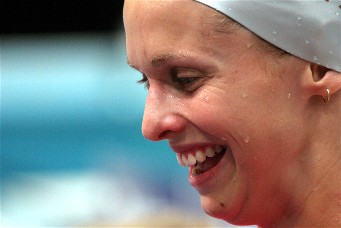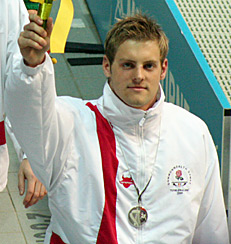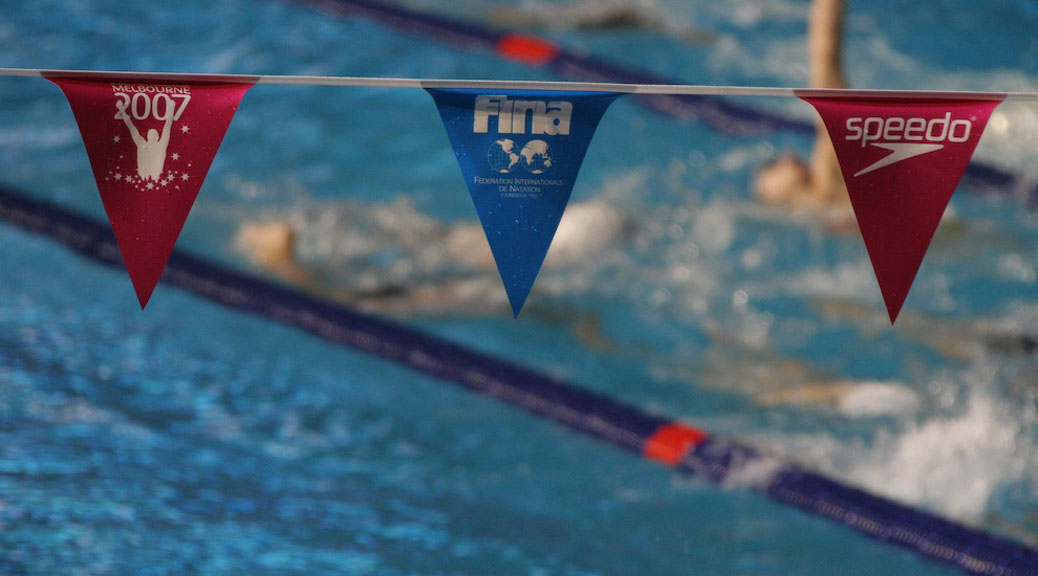It was quite a week in Melbourne, faster than even the most optimistic observer could have hoped as the swimming world continues to move forward apace. The Americans once again dominated, with the rest of the world, bar Australia who hung grimly onto their toes in second on the medal table lost in their wake. Britain meanwhile encouraged in some areas but overall failed to deliver on the promise that had been shown in 2006.
Looking at the meet as a whole, there’s no need to say much about Michael Phelps. He is simply the greatest swimmer ever, his amazing versatility crowning an incredible talent. Certainly his cracking of Ian Thorpe’s 200m freestyle world record was a master class in front running but he also showed he has a racing heart as he overtook Ian Crocker again in the last metre of the 100m butterfly, much as he did in Athens.

Libby Lenton: 5 Golds in Melbourne
Photo: ©Dan Mitchell/pullbuoy
On the ladies side, it was a more even competition; Laure Manaudou stole the headlines with a stunning world record over 200m freestyle, but perhaps didn’t perform up to some pre competition predictions,. nonetheless she still came away form Melbourne with a hat full of medals and the swimmer of the meet trophy. That was a slightly odd decision, which seems unduly influenced by that 200m effort. Great though that was, the award is supposed to be about the swimmer of the meet not the swim of the meet. By that rationale, the winner should have been home favourite Libby Lenton who trousered 5 gold medals over the week.
Elsewhere there were upsets for some favourites with Ryan Lochte putting one over on compatriot Aaron Peirsol in the 200m backstroke with a new world record, d while Grant Hackett confirmed what had been suspected, namely that he has a lot of work to do ion the next 18 months if he is to realise his dream of a third consecutive Olympic title over 1500m. The great Australian was clearly still showing the effects of his layoff for shoulder surgery last year and we can only hope he is able to regain his 2005 form in time for Beijing in order to help the 30 lap event live up to the potential that was shown last week.
That event was the fastest it has ever been – the first 7 finishers dipping under 15 minutes, with 6 of them having achieved the feat in the heats, just to qualify for the final – a statistic that put paid to the hopes of Korean Tae-Hwan Park, who had taken an epic 400m freestyle win earlier in the week. Those qualifiers were headed by Britain’s David Davies who started as a warm favourite, but he and the rest of the field were undone by Pole Mateusz Sawrymovicz who established a lead and then applied increasing pressure over the closing stages to emerge as a worthy winner.
Davies took a third consecutive bronze medal at this level, and in doing so confirmed he sis one a of a rare breed of British swimmers who can mount the podium at a global level even when not at the top of his game – his best time would have placed him second by one one-hundreth of a second.
The only other swimmer in the British squad who fits that billing is Kirsty Balfour, who had been the subject of the most pre-event hype. She nearly didn’t live up to it but fought bravely to take an equal silver medal with Megan Jendrick of the USA over 200m breaststroke. That she was two seconds over her best time is immaterial given the dominance of Leisel Jones, but reinforces the class of the lady – her swim was still enough for silver despite not being on top form.

Liam Tancock: Turned Commonwealth silver into world bronze
Photo: ©Steve Buckley/pullbuoy
Britain’s other medallist certainly was at the top of his game; Liam Tancock demolished his British record twice on his way to Bronze over 100m and picked up a second bronze in the 50m event. His were the most impressive British swims of the week and showed that the hard work on his second 50 has paid off.
Meanwhile, although the efforts of those three swimmers showed an increase in the medal tally from Montreal in 2005, it was the manner of the overall British performance that disappointed. Last year confidence seemed to be oozing from every pore and the performances in the pool, certainly at the Commonwealth Games, reflected that. There were a few highlights along the way, Fran Halsall’s never-say-die anchor leg on the medley relay that so nearly brought a bronze medal, and Lizzie Simmonds’ appearance in the 200m backstroke final among them, but there seemed to be a general malaise hanging over the squad with a disappointingly small number of best times set.
There was talk of disrupted preparation, but the inability to replicate best times under pressure is not a new problem, and one that has yet again reared its head. Certainly the form of Simon Burnett is an ongoing concern, while the up and down form of some swimmers is another worry. In particular Melbourne showed that Britain doe snot have the depth in relays to carry one or more team members not quite at their best – three fourth and fifth places could have been converted in medals if everyone had fired on the night. That said the silver lining is the qualification of all 6 relays for the Olympics, with three remaining potential medal prospects.
Bill Sweetenham has said that British Swimming will concentrate on those who have a chance of medals in Beijing over hate next 18 months which will probably mean a core group of relay swimmers plus a few select individuals, Davies, Balfour and Tancock the only athletes to take advantage of preselection, making the trip to China.

